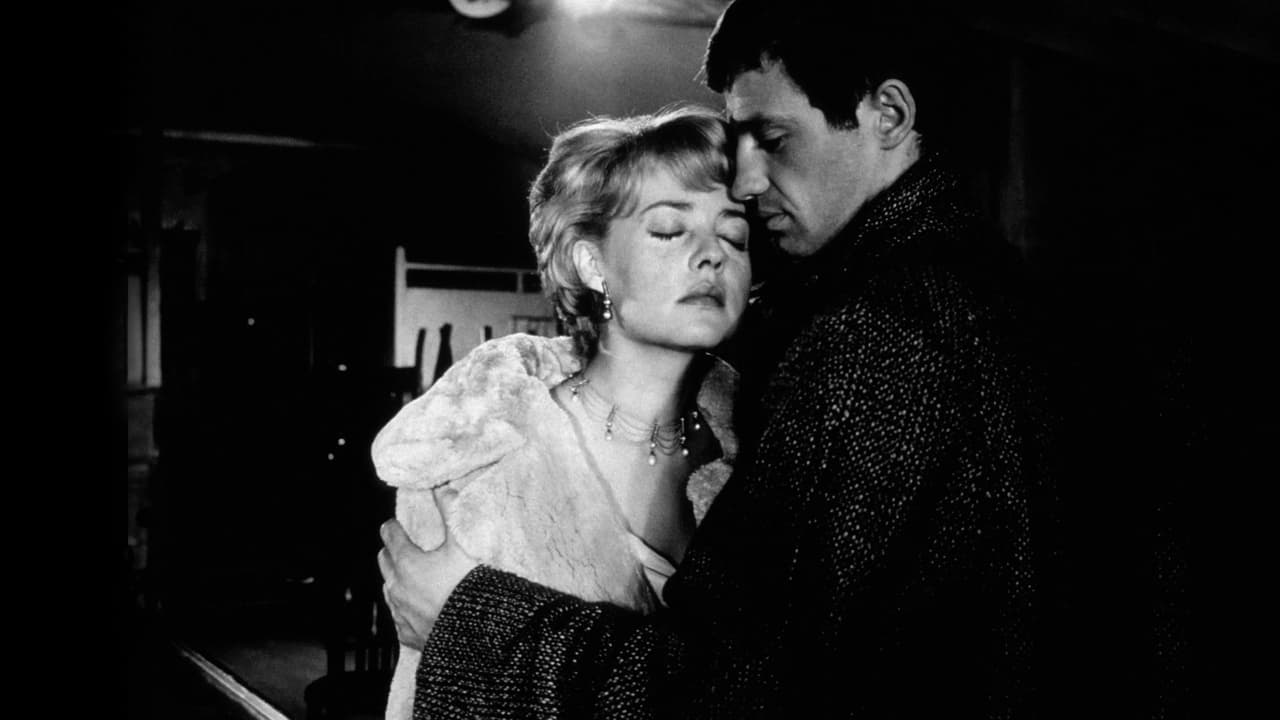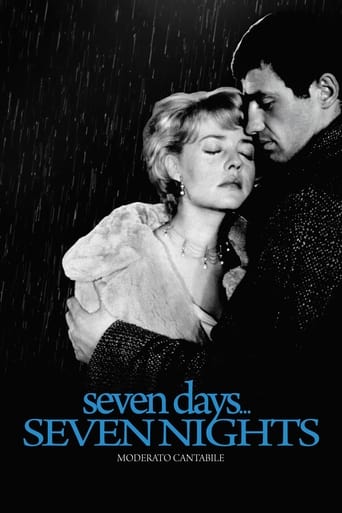

Moderato cantabile (1960) was shown in the U.S. with the title Seven Days . . .Seven Nights. Peter Brook directed this French film, and Marguerite Duras adapted her novel for the screen. (Note that IMDb has the film listed with its U.S. title, although the VHS uses the original French title, and lists the date of release as 1959.) The plot of the movie is somewhat basic. A beautiful woman leads a banal life as the trophy wife of a town's leading industrialist. Her only pleasure is her interactions with her son, Pierre, who is about seven years old. (The title Moderato Cantabile comes from the son's piano teacher, who is trying to get him to understand the concept.)Within the first few minutes of the film, a horrible scene occurs in a bar right next to the piano teacher's home. For the rest of the film, the plot keeps circling back to discussion that event. We assume something bad is going to happen, although we don't know what.Jeanne Moreau plays the wife, Anne, and Jean Paul Belmondo plays Chauvin, someone who works in her husband's factory. They meet and discuss the event, and then we watch their relationship unfold.This would be just another black and white French film from the 1950's, except that it stars Moreau and Belmondo. Belmondo is a formidable masculine presence, with his high cheekbones and his broken nose. Moreau is unique--certainly one of the great actors of the 20th Century.Director Brooks knows that when he is working with Moreau he is working with an extraordinary actor, and he lets us know that he knows. In one scene, there's a single image of Moreau's face that fills the screen. That single image is on the screen for almost 30 seconds! Those large eyes and downturned mouth are a part of French and worldwide cinematic culture.I want to make note of Didier Haudepin, who plays Moreau's son, Pierre. He's an extraordinary child actor, because he looked as if he weren't acting. He had a major role in the movie, but it appeared that he was just a normal kid who didn't like piano lessons. It's hard for an actor-- especially a child--to look as if he weren't acting. Haudepin managed it, and it's no surprise that he went on to have an outstanding career in film.We saw this movie on VHS cassette, but it's available on DVD. It's an excellent film, and definitely worth seeking out and viewing.P.S. We became interested in Moderato Cantabile because years ago we acquired an original movie poster of the film. We eventually donated the poster to the excellent Little Theatre in Rochester, NY. If you attend The Little, you'll see it prominently displayed. Our thought to ourselves was--you've seen the poster, now watch the movie!
... View MoreAlmost surreal in its emptiness, boredom, and the incomprehensible melodrama of the main character. I think her motivation is explained by her being in a constant state of boredom and despair, who is briefly given a futile energy when she eroticises the death of a stranger at the hands of a lover and finds a man willing to, briefly, play along with her fascination and give her a slight thrill in a flirtatious acquaintance based on discussing the case. But nothing really happens. At all. Then he says he's leaving, she screams in despair, and then it ends. Was she disappointed she didn't arouse enough passion in him for him to murder her? It's basically a bored wife in a passionless marriage having an extremely brief and relatively mild breakdown that leads to nothing. I had a hard time empathising with her, which unfortunately might be the key to really getting the most out of this film. The mother/child relationship is touchingly portrayed though.There's also an atmosphere of unsettling hostility in the village that I just don't understand the purpose of, but I've noticed that in french films before so maybe it's just how life is over there in a provincial town. It's beautifully made and there's some lovely cinema-photography.
... View Morefor the Duras's atmosphere. for the lead actors. for the story, landscapes, dialogs, the piano lesson or for its end. for the illustration of a state of soul as result of a mixture of sin, fear, high expectations and fall. a film about a woman and a man. all in simple manner presented. a town. and few meetings. and level of dark revelation. a film of silhouettes and silence. and it is enough for discover an universe who could be part from yourself. a film about choices. and about a strange form of music. Jeanne Moreau is not a surprise. Belmondo is the perfect choice despite the expectations about other actor if you read the novel. the result - not comfortable but good occasion for reflection. about love. and about versions of Madame Bovary.
... View MoreThis has to be one of the dullest films of the early Sixties. Remember that Godard, Malle, Truffaut and company had been challenging the traditions of story telling; the world seemed young again, and full of possibilities. Moderato cantabile has nothing of this spirit. It might have been made by an old-guard director like Clément or Delannoy (if they had decided to take a chance on a Duras script).There isn't much energy or interest in this story: what happens in the first ten minutes is endlessly rehashed throughout the remainder. Belmondo is ill at ease here, or at least seems that way to me--there is no chance for any extroversion, exuberance or even anger from the character. Jeanne Moreau is used decoratively (Brook must have seen what Resnais was able to do with Delphine Seyrig in Last Year In Marienbad) and always looks elegant, if never really desperate or anguished. You know something's wrong when the piano teacher provides much of the dramatic interest: she's bullying the child into giving her a Diabelli sonata "moderately, with a singing feeling".Note: I have just remembered that Clément did do a Duras script (Barrage contre le Pacifique) in 1958.
... View More